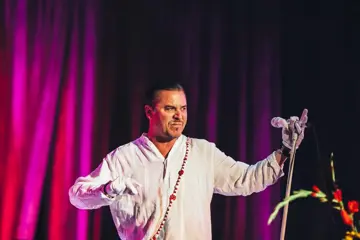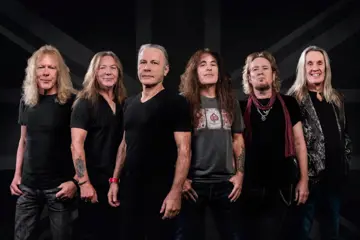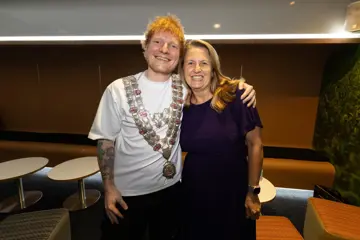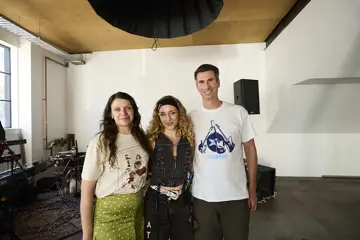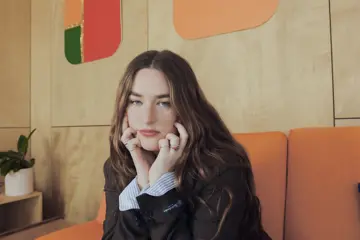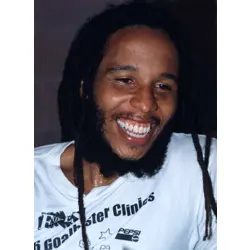 Ziggy Marley
Ziggy MarleyA five-time Grammy Award-winning musician, actor, activist, humanitarian – David “Ziggy” Marley, the eldest son of the late reggae pioneer Bob, certainly wears a lot of hats (he's also released a comic book, the self-explanatory Marijuanaman), which suggests that, at least in his case, the usual soporific effects of vast intakes of the devil's weed haven't manifested for him. Perhaps it's genetic. Ziggy Marley is still very much a champion of the music his father brought to the international stage. And his latest and fourth solo album, Wild And Free, champions both the weed and the importance of the family. After all, there's a song, Roads Less Travelled, about his father on there, another co-written with his own eldest son, Daniel, plus another welcoming his youngest son, Abraham Selassie Robert Nesta Marley, now 14 months, into the world.
“Welcome To The World was written before [Abraham] was born and I was thinkin' about bringin' a new child into the world,” Marley explains, on the line from California – he splits his time between there, Florida and Jamaica. “That's what I thought about sayin' to him when he came that day – welcome to the world; I can give you love but I cannot promise that world is gonna be the greatest place you've ever been to, you know?
“With Daniel, he's twenty-one and he's tryin' to get into music and I was just sayin', 'Just come and do somethin' with us on this new album,' see if I can just give him a helpin' hand in what he's doin', you know? Changes was actually written by me and Linda Perry, a producer/songwriter – she works with Christina Aguilera and Alicia Keyes – so we did that together sometime before and then when I did it for the record, my idea was that I needed something else to add to it and so Daniel came and did that little DJ rap thing in it.”
As with pretty much anything with the name Marley attached to it, Wild And Free is as much about addressing issues as it is the music it contains and uppermost in terms of issues for Ziggy Marley, who is an advocate for the Freedom from Genetically Modified Organisms movement, is that of hemp.
Don't miss a beat with our FREE daily newsletter
“I definitely wanted to address the issue of hemp and marijuana, so that was like the template that I started with, that I wanted to talk about this issue and that's why the album is called Wild And Free. I wanted that to be the message that was out front. The environment and the earth, I mean this is where we get a lot of our inspiration from, nature. It seem like we keep on harpin' on issues like this, it seems that even though governments and organisations, they talk about it too, but to me, it's just talk – it's not real because if it was real, hemp would be legal. This is why the focus of the album is a plant, because the plant can save the planet. The plant, it has an industrial use and so if people, if governments round the world were serious about the green – the so-called green revolution – instead of just usin' it as a marketin' ploy as a way to placate the people, then this plant would be on the forefront of that because we can do so much with it. So this is why I know it's hypocrisy within the system. We just have to shout about it because we have no choice – what else we gonna do? We can't just sit down… we're not governments, we're not leaders of the world. If we had the power to do something we would have done it. But the only power we have is our voice.
“But songs just came as we went along and I had some songs that were sittin' there that I hadn't recorded, I hadn't released, songs I've ten, eleven, twelve years ago, and it was like let me do a version of this song and get it out.
“But a lot of the songs were written, like, in the year before I went into the studio. On this album I think I tried to focus on the songs and the songwritin' so I spent a lot of time in the studio just by myself tryin' to get the songs down in a more constructed way, so when I actually went to record the album with the band, the songs were already done. I didn't have to, like, think about lyrics here – the songs were done and I wanted to put a lot of effort into the writin' of the songs on this record, which I think lyrically is some of my best writing, you know.”
Co-producing the record with Marley was legendary producer and musician Don Was, whose credits sprawl across artists as diverse as Bob Seger, Elton John, David Crosby and The B-52's. “The idea of the record is to make real music,” Marley explains. “Don is a friend of mine and we work together for many years you know and he just… Don, for me, we can make the music be real and we can make the music be spiritual and music that will outlast fads and trends and so… I love workin' with Don and he's someone I'll work with again and again because it's about the spirit in the music. That's what it's about for me; it's about makin' music that… We're tryin' to reach somethin' on a spiritual level, you know, and my experience with Don is that's where his head is at too.”
Marley, like his siblings, was always going to have a hard time making his mark in the music world considering the enormity, both musically and mythically, of the legacy lefty by his father. He kicked off his career featuring, with siblings Cedella, Stephen and Sharon Marley, on a track called Children Playing In The Streets, with their father Bob in 1979, but their debut album as Ziggy Marley & The Melody Makers, 1985's Play The Game Right, didn't impress the hardcore reggae crowd with its obvious heavy pop leanings. In 2003, Marley finally stepped out of the group to release his debut solo album, Dragonfly, but it was his second, 2006's Love Is My Religion, that finally consolidated his career, winning a Grammy for best reggae album.
“I think I've found my sound and my voice and hopefully I'll continue to grow and to fine tune, you know, myself as a human bein' and my music – and that will be continually be evident on the music that I bring out in the future, that there is always a continual growth and never a stagnant state; it's always growin' and goin' forward.”





